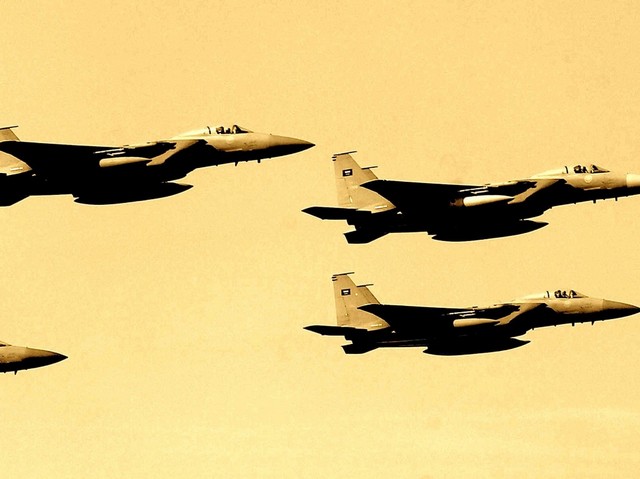By Junaid S. Ahmad
There has been an incredibly healthy debate in Pakistan concerning the Kingdom of Saudi Arabia’s ‘request’ that Pakistan militarily assist the former’s assault on the Houthi rebels – who are challenging the rule of its Yemeni ally. A solid majority of Pakistanis are legitimately skeptical of their state slavishly subordinating itself to the diktat of the gulf monarchy that believes its oil wealth can purchase blind subservience from a poor country like Pakistan. The intense questioning taking place in the country is quite exciting, for a number of reasons.
One of the most significant reasons is that the ostensible ‘sectarian’ nature of the conflict has not clouded the political judgment of most Pakistanis, whether Sunni or Shia. Despite the desperate attempts of the Saudis to characterize any development in the Middle East and beyond as a ‘Shia/Iranian conspiracy’ against Sunnidom, most folks are not buying it this time. The gratuitous and malignant interventions the Saudis carry out throughout the region and wherever they can get their hands on a Muslim community have become too obvious to overlook. The Kingdom’s recent machinations in Iraq, Egypt, Bahrain, and Syria have produced enormous bloodshed, mayhem, and new generations of puritanical and violent jihadis. This is of course consistent with the politically reactionary role the Saudis have always played – and our part of the world should know that best.
The fact that there is indeed commentary that is emphasizing how sectarianism is a camouflage for profoundly political causes is noteworthy and important. However, what is actually required now is deeper analysis to understand what is driving this ‘geo-sectarian’ card that the Saudis have been playing since 1979.
The Islamic Revolution in Iran in that year sent shockwaves throughout the region, but especially to the conservative gulf monarchies. The fear was that the revolutionary spirit of that moment would spread quickly, and would transcend any Shia-Sunni divide. In fact, it was doing that. Students, intellectuals, and oppressed groups who were reading either Sayyid Qutb, Che Guevara, or Mao Tse-tung were now immersing themselves in the vocabulary of Ali Shariati and Khomeini. There was no contradiction for them, neither the sectarian (Sunni vs. Shia revolutionary ideology) nor the secular vs. religious one. There was continuity in a discourse that challenged power and favored the oppressed.
Indeed, the central – and very simple – factor that caused the royal despots of the Gulf to unleash political and sectarian warfare to punish Iran was the Islamic revolution’s staunchly anti-monarchical orientation. It was, after all, the brutal regime of the Shah of Iran that the mass movement of Iranians sought to overthrow. The Saudis and the other sheikhdoms of the Gulf understood very well that the anti-monarchical impulse would seem to most Muslims as more compatible with an Islamic political ethos than the petro-autocracies of Arabia. And this is precisely why there was never any political argument used to discredit the Islamic revolution, but a virulently sectarian one: they are Sahaba-hating Shias trying to impose Shi’ism on everyone else. Period.
The sectarian vitriol emanating from Riyadh was disseminated throughout the Muslim world, and accompanied by support for state and non-state actors willing to do the dirty work for the Kingdom. The assault on the anti-monarchical tendency began right away, with the support for Iraq’s invasion of Iran in 1980 – and has continued ever since. But those efforts to engender religious divisions between Shia and Sunni failed in 2006. Hezbollah’s courageous resistance against Israeli aggression seemed to have captured the hearts and minds of all Arabs and Muslims regardless of theological orientation. The movement’s leader, Hassan Nasrallah, was by far he most popular Arab leader then.
Which is why, just like after 1979, the Saudis had to shift to hyper-sectarianism once again to discredit the politics of popular resistance and mass mobilization. The vicious Syrian civil war gave a boost to such reactionary politics, since it was described as Shia-Alawi assault on the Sunnis – and similarly portrayed in the case of Iraq.
But what reminds us that it is the political and not the religious/sectarian that is paramount is what happened in Egypt. The force that the Kingdom itself had nurtured, the Muslim Brotherhood, was then disowned and punished. General Sisi’s coup against President Morsi was wholeheartedly endorsed by the Saudis who no longer saw the Brotherhood as a conservative social force protecting the region from progressive ideologies, but as a political force rooted in mass, popular, agitational politics that of course all monarchies abhor.
It is, therefore, essential to think about the maneuvering of the Saudis and its neighbors in this deeply political way. Their politics is nothing but opposing any mass oppositional politics, be it Shia, Sunni, socially conservative or liberal. It is rarely described this way, but the real political battle in the region is between Muslim monarchical rule and Muslim republicanism. Meanwhile, the Saudis will persist in trying to fool you into believing it is about theology and creeping Shia expansionism. Fortunately, many more Muslims are now unwilling to give credulity to such shallow polemics – no matter how much oil wealth is poured into making the narrative seem believable.
Junaid S. Ahmad is Director for the Center for Global Dialogue, UMT, and has been teaching law and politics at LUMS.
April 2015

